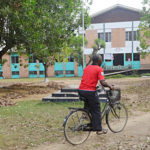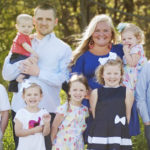The interim president of a Baptist seminary forced out of Liberia by the Ebola outbreak says the crisis is taking a toll far greater than those who catch the illness.
Richard Wilson, a professor at Mercer  Liberia Baptist Theological Seminary President Richard Wilson, on loan from Mercer University, was forced to return to the United States when the Ebola epidemic exploded. (Photo provided)University in Macon, Ga., on loan for a year to lead post-civil war rebuilding efforts at the Liberia Baptist Theological Seminary, returned to the United States after the Ebola crisis became too much of a threat for him to stay.
Liberia Baptist Theological Seminary President Richard Wilson, on loan from Mercer University, was forced to return to the United States when the Ebola epidemic exploded. (Photo provided)University in Macon, Ga., on loan for a year to lead post-civil war rebuilding efforts at the Liberia Baptist Theological Seminary, returned to the United States after the Ebola crisis became too much of a threat for him to stay.
While the disease is out of control in Liberia, Wilson said in an email update to supporters, less media attention has been given to humanitarian and political problems arising in its wake.
“From the beginning of this crisis, I have attempted to distinguish between those afflicted by Ebola and those affected by the virus,” Wilson said.
Wilson is using his unexpected time in the United States to undergo hip-replacement surgery. He planned to put it off until December, but he has been plagued by chronic osteoarthritis. He rejected, however, well-meaning suggestions his early surgery is evidence of providential care.
“I reject the notion that God would choose to allow the deaths of 1,200 or more West Africans in order to ease the pain of one white man from Macon, Ga.,” said Wilson, the Columbus Roberts Professor of Theology and chair of the Roberts Department of Christianity at Mercer.
God shares the agony of his creation
“I prefer a theology that emphasizes that the Creator shares the agonies of creatures (not only humans) that are part of a complex creation in which pain, suffering and even evil are possible.”
The media is underreporting outbreaks of violence in Liberia, as police confront a people with fresh memories of 30 years of civil war, Wilson said. During the best of times, he said, 90 percent of Liberians subsist on $1 dollar a day. For many, that means “hustling” for small money in usually busy marketplaces now emptied by demands for isolation.
Sign up for our weekly edition and get all our headlines in your inbox on Thursdays
“The result is a humanitarian issue,” Wilson said. “Hunger is growing in Liberia. It will continue to become the most critical issue.”
The problem doesn’t end there, he insisted. “Hungry people become desperate,” he said. “Desperation breeds violence. Violence leads to conflict.”
Confronted by the humanitarian crisis, Wilson and the seminary’s administrative staff conducted a census and discovered 100 people were living on the campus. Knowing those people did not have money to purchase food—and if they did, they would be at risk if they left the compound—seminary officials calculated they could provide one meal for one person for 33 cents a day.
They set out to raise $1,000 a month to purchase, transport and deliver food to the compound through strict protocols to prevent opportunities for pilfering.
Humanitarian response
“No one—including me—in the chain ever touches real money,” Wilson explained. Donations are channeled by check through Lamberth Memorial Baptist Church in Roxboro, N.C. When they total $5,000, a wire is sent to the bank in Liberia where the seminary has its accounts.
In consultation with a pastor and the seminary’s finance director, Wilson authorizes the purchase of food. The seminary team finds the best prices for rice, beans, oil and seasoning cubes. A check is issued to the wholesale distributor for food and transportation, and those who distribute the food follow strict protocols.
“The precise protocols are necessary, especially in post-war Liberia,” Wilson said. “In addition to providing food for the hungry, we are modeling a transparent process that ensures there is no financial leakage, i.e., not opportunity for anyone to siphon off funds or goods intended for others.”
Early response to the initiative has been positive, and in one recent week, the seminary managed to feed 100 people, he reported. From the start, the plan has been to duplicate the Care for One Hundred model in other locations, and discussions are under way with Liberian Baptist Missionary and Educational Convention leaders about identifying other compounds throughout the country where they can expand the work using the same protocols, he added.
A setback, not a defeat
The Ebola crisis has diverted attention from other needs at the seminary, Wilson said, but he views it “a setback, not a defeat.”
“This crisis will pass,” he said. “When it does, we will emerge stronger and prepared to move forward. Even in the midst of crisis—especially in the midst of crisis—we follow our motto and seek to “walk worthy of the calling to which we have been called.”














We seek to connect God’s story and God’s people around the world. To learn more about God’s story, click here.
Send comments and feedback to Eric Black, our editor. For comments to be published, please specify “letter to the editor.” Maximum length for publication is 300 words.